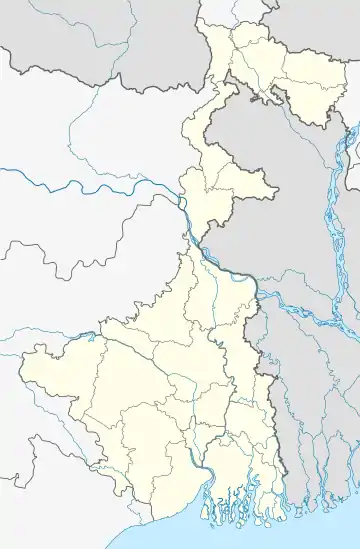Tisa, Hooghly
Tisa is a census town in Chanditala II CD Block in Srirampore subdivision of Hooghly district in the state of West Bengal, India.[1]
Tisa | |
|---|---|
Census Town | |
 Tisa Location in West Bengal, India  Tisa Tisa (India) | |
| Coordinates: 22.7540°N 88.2526°E | |
| Country | |
| State | West Bengal |
| District | Hooghly |
| Population (2011) | |
| • Total | 4,882 |
| Languages | |
| • Official | Bengali, English |
| Time zone | UTC+5:30 (IST) |
| Vehicle registration | WB |
| Lok Sabha constituency | Hooghly |
| Vidhan Sabha constituency | Singur |
| Website | wb |
Geography
| Cities and towns in Chanditala I, Chanditala II and Jangipara CD Blocks in Srirampore subdivision in Hooghly district M: municipal city/ town, CT: census town, R: rural/ urban centre, Owing to space constraints in the small map, the actual locations in a larger map may vary slightly |
Location
Tisa is located at 22.7540°N 88.2526°E.
Kharsarai, Tisa, Kapashanria, Jaykrishnapur, Purba Tajpur, Begampur, Baksa, Panchghara, Chikrand, Janai, Pairagachha, Naiti, Barijhati, Garalgachha and Krishnapur, all the census towns form a series from the northern part of Chanditala II CD Block to its southern part. The only municipality in the area, Dankuni, located outside the CD Block, occupies the south-east corner of the entire cluster.[2]
Urbanisation
Srirampore subdivision is the most urbanized of the subdivisions in Hooghly district. 73.13% of the population in the subdivision is urban and 26.88% is rural. The subdivision has 6 municipalities and 34 census towns. The municipalities are: Uttarpara Kotrung Municipality, Konnagar Municipality, Serampore Municipality, Baidyabati Municipality, Rishra Municipality and Dankuni Municipality. Amongst the CD Blocks in the subdivision, Uttarapara Serampore (census towns shown in a separate map) had 76% urban population, Chanditala I 42%, Chanditala II 69% and Jangipara 7% (census towns shown in the map above).[3][4]All places marked in the map are linked in the larger full screen map.
Gram panchayat
Villages and census towns in Kapasaria gram panchayat are: Kapashanria, Okardaha, Sahana, Sanka and Tisa.[5]
Demographics
As per 2011 Census of India Tisa had a total population of 4,882 of which 2,496 (51%) were males and 2,386 (49%) were females. Population below 6 years was 466. The total number of literates in Tisa was 3,681 (83.36 % of the population over 6 years).[4]
Dankuni Urban Agglomeration
As per the 2011 census, Dankuni Urban Agglomeration includes: Dankuni (M), Purba Tajpur (CT), Kharsarai (CT), Begampur (CT), Chikrand (CT), Pairagachha (CT), Barijhati (CT), Garalgachha (CT), Krishnapur (CT), Baruipara (CT), Borai (CT), Nawapara (CT), Basai (CT), Gangadharpur (CT), Manirampur (CT), Janai (CT), Kapashanria (CT), Jaykrishnapur (CT), Tisa (CT), Baksa (CT), Panchghara (CT) and Naiti (CT).[6]
Transport
The nearest railway station, Begampur railway station is 23 kilometres (14 mi) from Howrah on the Howrah-Bardhaman chord line and is a part of the Kolkata Suburban Railway system.[7][8]
It is off NH 19 (old numbering NH 2)/ Durgapur Expressway.[8]
References
- "Mouza Information". Land & Land Reforms Department, Government of West Bengal. Archived from the original on 22 December 2016.
- "Census of India 2011, West Bengal: District Census Handbook, Hooghly" (PDF). Map of Chanditala II CD Block, page 663. Directorate of Census Operations, West Bengal. Retrieved 4 October 2018.
- "District Statistical Handbook 2014 Hooghly". Table 2.2, 2.4(a). Department of Statistics and Programme Implementation, Government of West Bengal. Retrieved 3 October 2018.
- "C.D. Block Wise Primary Census Abstract Data(PCA)". 2011 census: West Bengal – District-wise CD Blocks. Registrar General and Census Commissioner, India. Retrieved 3 October 2018.
- "Okardaha". Indian Village Directory. Retrieved 18 October 2018.
- "Constituents of urban Agglomerations Having Population 1 Lakh & above" (PDF). Provisional Population Totals, Census of India 2011. Retrieved 20 October 2018.
- "36811 Howrah Bardhaman Local (via Chord)". indiarailinfo. Retrieved 6 October 2018.
- Google maps